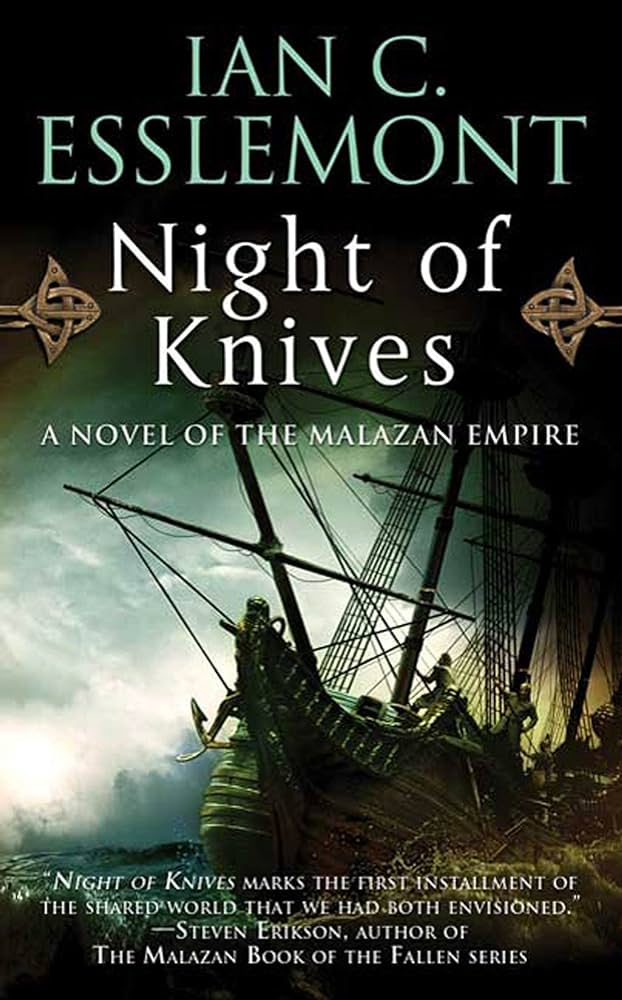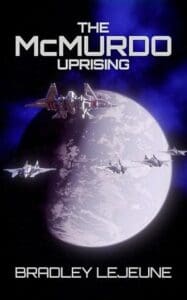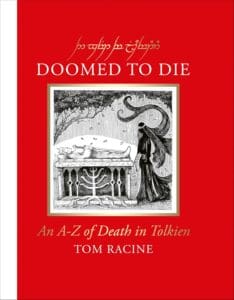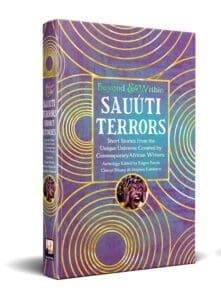
Synopsis:
The empire is named for the tiny island and city of Malaz, now a sleepy, seedy backwater port. Tonight however, a once-in-a-generation Shadow Moon brings demon hounds and darker beings. Also, a prophecy promises the return of long missing Emperor Kellanved to the contended imperial throne. This night will determine the fate of the world.
Review:
“The Malazan way,’ he breathed. ‘The murderer’s touch. A brush of cloth. A sip of wine. The gleam of a blade as fine as a snake’s tooth. Your name whispered just as you fall into sleep.”
I think it’s fair to say at this point that Malazan might have, sort of, entirely taken over a good portion of my personality. I find myself whispering ‘Hoods breath!’ when I stub my toe and ‘First in last out.’ when I’m in need of reassurance. I could not merely stop reading about this world with the end of Malazan Book of the Fallen. I’m too invested, far too soul bound into this series that has everything I could want in fantasy. Imagine my child-like joy at discovering more books filled with all the gritty, mind-numbing, bloody, heart-breaking, worldbuilding and characters continued in many, and I do mean many, spin-off series. First of which I’ve body slammed through is Night of Knives, the first book in Novels of the Malazan Empire.
This series is sort of an accompaniment to the main Erikson 10 book Malazan epic. It follows plots that were mentioned in Malazan Book of the Fallen but fell to the side due to other, more important events happening. These threads are what Esslemont, Erikson’s friend and colleague who created the Malazan world with him, tackles. For those who have read Gardens of the Moon, you will remember the iconic prologue that started our Malazan journey. Night of Knives tells the tale of the night not long after the prologue, the night of Emperor Kellanved’s foretold return. This was always an event whispered with the utmost mistrust. No one is sure what really happened and there are many versions of it rumored throughout the main Malazan series. Night of Knives puts these rumors to rest and gives us the truth of what actually happened.
First let’s talk about the differences between Esslemont and Erikson. If you’re expecting a poem before each chapter, vague explanations of details you might have to read over in order to understand scenes, or the description of a flower on the wind to invoke a gut-wretching emotional response, reevaluate your expectations. Esslemont is not Erikson and that is not a fault. Erikson has the tendency to avoid holding hands with the reader as much as possible. He will explain nothing to you and expect you to be paying attention and to figure it all out for yourself. Esslemont is within hands reach. As soon as you feel yourself slipping, he reaches out with a quick explanation before letting you walk on your own again. Esslemont is much more direct in his approach to the world. His prose is not as profound as Erikson, who seems to make every chapter into just one long poem, but he is still able to convey the beautiful complexity that is Malazan. It’s dark humor and wit. The emotional nuance that feels unique to this world.
Esslemont writes on a much smaller scale. Night of Knives follows mainly two points of views with some others sprinkled in for spice. Temper is a grumpy war veteran with a heart of gold, who has seen far too much. A Malazan classic. I loved following this man’s perspective for the flashbacks in his chapters. This was amazing! These flashbacks were the best parts of the book, and I was transfixed by the fact that I was seeing actual history being played out from the main series that I never got to witness. The names that were dropped held me in nostalgic suspense, knowing where many of these characters ended up. The other perspective is Kiska, a young girl who wants nothing more than to be a soldier. Hmm, I wonder who this reminds me of? Pick another career, Kiska. Any. Other. Career. Anyways, I know she isn’t the most liked in the book nor the most interesting. But I have to say I was never irritated by her character. She very young and she acts like it. She has a really incredible arc of overcoming her fears and understanding that sometimes the world may not revolve around her. I thoroughly enjoyed seeing some wildly important characters have monumental conversations that effect books to come through her eyes. It really brings the Malazan world down to eye level and shows that some of these characters are just people trying to survive the next day with nothing special about them. Although Kiska does have something special about her, she’s just a kid and I was just as engaged in her chapters as I was with Temper.
The climax was utterly unstoppable! Erikson writes either long, drawn out, and incredibly detailed battle sequences or short, wild west, over-in-two-paragraphs duels between two insanely powerful characters. Esslemont is somewhere in between that, which I loved. Don’t misunderstand me. I love Erikson’s battles. They’re some of the best in the genre, but Esslemont slower pace and attention to longer fight sequences on a smaller scale was a breath of fresh air. Night of Knives is the length of a regular novel, hence the series name Novels of the Malazan Empire. However, I could not help the feeling that I was reading a novella. Is it possible to write a novel length novella? Perhaps when compared to Erikson monolithic 10 book epic, Esslemont’s entry into the series is a novella.
I cannot imagine a brain that would inhabit my skull to think of a series so vast and elaborate as Malazan. It’s only by sheer brilliance that both Erikson and Esslemont possess the ability to have entirely two different writing styles and still be able to capture the essence of the setting and characters. Even though I’d met many of these characters in the main series, Esslemont managed to write them true to their identities while making them his own since this book is set before Malazan Book of the Fallen. Many of these characters have not grown into their grimdark personalities quite yet, so it was interesting to read them in a different but similar light.
This book isn’t perfect, but neither were many of Erikson’s. It doesn’t mean that Esslemont is not worth your time. It is different. Embrace the difference. The lore alone is reason enough to continue expanding your knowledge with Esslemont’s entries into Malazan. For my part, I enjoyed both the worldbuilding aspect and the storytelling craft. What I was most worried about was the story not feeling like Malazan and I’m happy to say that in my not so professional, and totally based on opinion take, that was not the case here. Night of Knives was absolutely epic on a more focused Malazan scale, which is exactly what it is trying to be by telling the smaller, but by no means less important events that happened off page in Erikson’s epic. There are many who are satisfied with ending their Malazan journey with Erikson and that is completely fine. Read what you want. Life is too short for anything else, but if you’re dying to see some truly epic happenings told but not shown in the main series, start Night of Knives and take the journey with me through Esslemont’s version of events. You might find yourself frothing at the mouth for more.








Leave a Reply